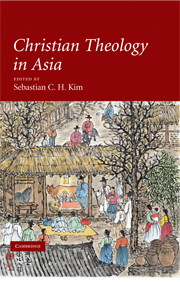Book contents
- Frontmatter
- Contents
- Contributors
- Preface and Acknowledgements
- 1 FORMATION OF CHRISTIAN THEOLOGIES IN ASIA
- II THEOLOGICAL THEMES OF CHRISTIANITY IN ASIA
- 8 Religious pluralism, dialogue and Asian Christian responses
- 9 Cross-textual hermeneutics and identity in multi-scriptural Asia
- 10 Re-constructing Asian feminist theology: toward a glocal feminist theology in an era of neo-Empire(s)
- 11 The ecumenical movement in Asia in the context of Asian socio-political realities
- 12 Mission and evangelism: evangelical and pentecostal theologies in Asia
- 13 Subalterns, identity politics and Christian theology in India
- Index
- References
13 - Subalterns, identity politics and Christian theology in India
Published online by Cambridge University Press: 05 June 2012
- Frontmatter
- Contents
- Contributors
- Preface and Acknowledgements
- 1 FORMATION OF CHRISTIAN THEOLOGIES IN ASIA
- II THEOLOGICAL THEMES OF CHRISTIANITY IN ASIA
- 8 Religious pluralism, dialogue and Asian Christian responses
- 9 Cross-textual hermeneutics and identity in multi-scriptural Asia
- 10 Re-constructing Asian feminist theology: toward a glocal feminist theology in an era of neo-Empire(s)
- 11 The ecumenical movement in Asia in the context of Asian socio-political realities
- 12 Mission and evangelism: evangelical and pentecostal theologies in Asia
- 13 Subalterns, identity politics and Christian theology in India
- Index
- References
Summary
PUZZLES ON THE GROUND, REMEMBERING THE CONTEXT
Let me start by stating how I have come to forge a relationship between subalternity, identity politics and Christian theology in India. In 2001 I took my class of twenty-four students to spend three days with a dalit Christian community in a Tamilnadu village in south India. I made this a requirement for my course on ‘dalit theology’, which I taught from 1996 to 2004 at the United Theological College, Bangalore. This pilgrimage was designed to enable all of us to journey into the community we studied in our classrooms. But it was also a journey into ourselves: our notions of self and other, our conceptions of mission and our realization of the nature of the Indian Church. During this visit, as is our custom, we slept and prayed in the church, ate, sang and danced with the families and spent our time visiting the various communities that made up this village.
Through our time there we discovered that the Indian community seemed to be divided along several lines. To begin with there was the caste community and the dalit community partition: there existed the obvious conventional division between the caste community and the dalit community. Apart from geographical distance, the lives of these two respective communities revolved around their own deities, their own cultural festivities and their own socio-economic network of interaction. Then, as is true of much of rural India, there was the intra-dalit community division.
- Type
- Chapter
- Information
- Christian Theology in Asia , pp. 271 - 290Publisher: Cambridge University PressPrint publication year: 2008



